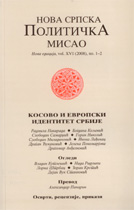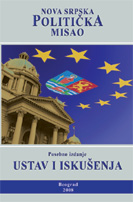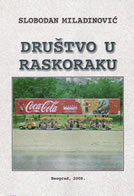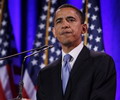| NSPM in English | |||
Europe Feels Snubbed by Obama |
 |
 |
 |
| субота, 06. фебруар 2010. | |
|
(The New York Times, 3.2.2010)
In addition to the palpable sense of insult among European officials, there is a growing concern that Europe is being taken for granted and losing importance in American eyes compared with the rise of a newly truculent China. European Union officials found out about the decision through the news media late on Monday, senior European officials said Tuesday morning. The decision was first reported on the Web site of The Wall Street Journal. The Spanish prime minister, José Luis Rodríguez Zapatero, who is scheduled to arrive in Washington this week on a visit, was described as angry and embarrassed, and European officials said there was a set of high-level diplomatic exchanges overnight. The White House explained the decision as a matter of scheduling, insisting that the May visit to Europe was never on the president’s agenda, so it could not be said to have been canceled. European officials said that two senior American officials — the under secretary of state for political affairs, William J. Burns, and the assistant secretary of state for European affairs, Philip H. Gordon — had attended a preparatory meeting for the summit meeting two weeks ago in Madrid, and that there was no hint then that Mr. Obama would decide not to attend. But a senior American official said that Mr. Gordon and Mr. Burns emphasized to Spanish officials, when the meeting was raised, that they “were not in a position to commit to one.” In fact, the official said, the Obama administration has been “pursuing and getting a better relationship with Spain and the new E.U.,” with Mr. Zapatero visiting Washington twice. Speaking for Mr. Obama, Mr. Gordon told journalists in Washington on Monday that the trip to Spain “was never on his agenda.” The president had “traveled more to Europe in his first year probably than any president has ever done in the past, and he looks forward to continuing his engagement bilaterally with European allies and directly with the European Union.” Mike Hammer, the spokesman for the National Security Council, said that while there were no plans for the trip to Madrid, “the president is committed to a strong U.S.-E.U. partnership, and with Europe in general,” on topics like Afghanistan, counterterrorism, the global economy and climate change. Indications that Mr. Obama might forego the conference emerged in Davos, Switzerland, from foreign ministers who attended the global economic forum there. One senior European official suggested that after the loss of a Senate seat to the Republicans in Massachusetts, Mr. Obama would be doing less traveling to supposedly glamorous spots like Europe that would only feed Republican criticism. American officials said that Mr. Obama felt that the previous major American-European summit meeting, last June in Prague, was a waste of time, and European Union officials said that the president even skipped a leaders’ lunch at the smaller European Union-United States meeting in Washington last November, sending Vice President Joseph R. Biden Jr. instead, something they said that President George W. Bush would never have done. Charles Grant, the director of the Center for European Reform, a London-based research center, said that the Obama decision “is a useful wake-up call for the E.U.” He said the European Union must realize “that no one will court them or have summits with them because Europe is a nice idea. “They need to deliver.” Mr. Obama sees Europe as an important ally, but “Obama clearly has no emotional identification with Europe,” Mr. Grant said. “He has a cool, analytical view of allies and partners, but when the Europeans can’t provide much to help America solve global security problems, he doesn’t want to spend too much time on it.” The president of the European Commission, José Manuel Barroso, tried to play down the issue, saying he understood that, after “repeated trips to Europe and several meetings with European leaders,” Mr. Obama “now needs to cut down a bit on his foreign traveling.” He added that the group would “work with the United States to find a mutually agreeable date for the summit.” Europe and NATO have provided troops for Afghanistan, but not many more since Mr. Obama took office, particularly measured against the new American buildup. Europe is divided on Russia and the Middle East, and has been very helpful on Iran, but mostly bilaterally. “It’s unusual, and Europeans will be offended,” said Nicole Bacharan, a professor of political science at the Institut d’Études Politiques. “But for Obama, there is no urgency about the relationship with Europe. Europe works fine and he needs to refocus on urgent matters.” Relations with China have taken on new importance with the economic crisis, a confrontation over climate change and arms sales to Taiwan. Mr. Obama is also trying to push China to support harsher sanctions on Iran in the United Nations Security Council, which Beijing has been reluctant to do. With the absence of Mr. Obama, the summit meeting is likely to be canceled. Mr. Obama is scheduled to come to Portugal in November for a NATO summit meeting, so it is possible that the European Union meeting will be rescheduled to coincide with that. It might also be rescheduled if there is a new nuclear arms-control treaty for Mr. Obama to sign with Russia. The State Department spokesman, P. J. Crowley, said in Washington on Monday that the transition to a new leadership of the European Union after the ratification of the Lisbon Treaty might have been a factor. “Because of the changes involving the establishment of a E.U. council president and a European Commission president on top of the rotating E.U. presidency, I think it’s taking some time to work through exactly how various high-level meetings will happen. But we look forward to ongoing dialogue.” |
Од истог аутора
Остали чланци у рубрици
- Playing With Fire in Ukraine
- Kosovo as a res extra commercium and the alchemy of colonization
- The Balkans XX years after NATO aggression: the case of the Republic of Srpska – past, present and future
- Из архиве - Remarks Before the Foreign Affairs Committee of the European Parliament
- Dysfunction in the Balkans - Can the Post-Yugoslav Settlement Survive?
- Serbia’s latest would-be savior is a modernizer, a strongman - or both
- Why the Ukraine Crisis Is the West’s Fault
- The Ghosts of World War I Circle over Ukraine
- Nato's action plan in Ukraine is right out of Dr Strangelove
- Why Yanukovych Said No to Europe

.jpg)








 PARIS —
PARIS — 












